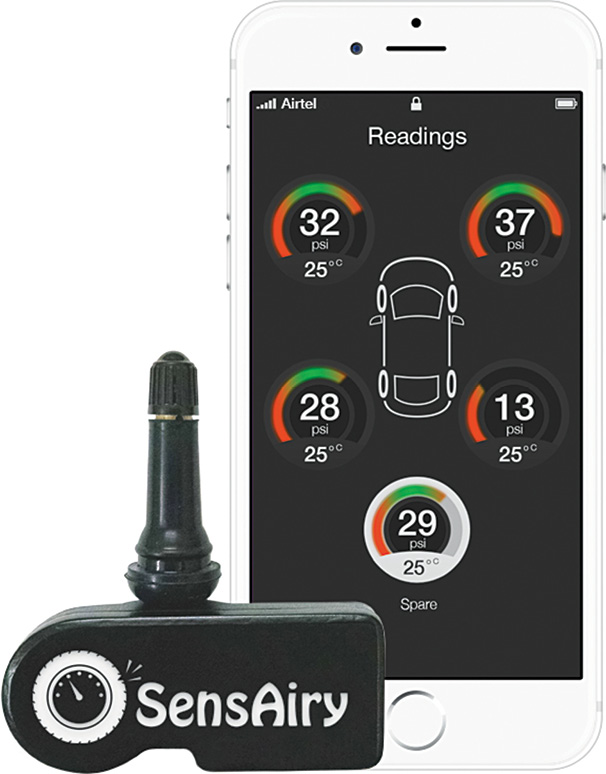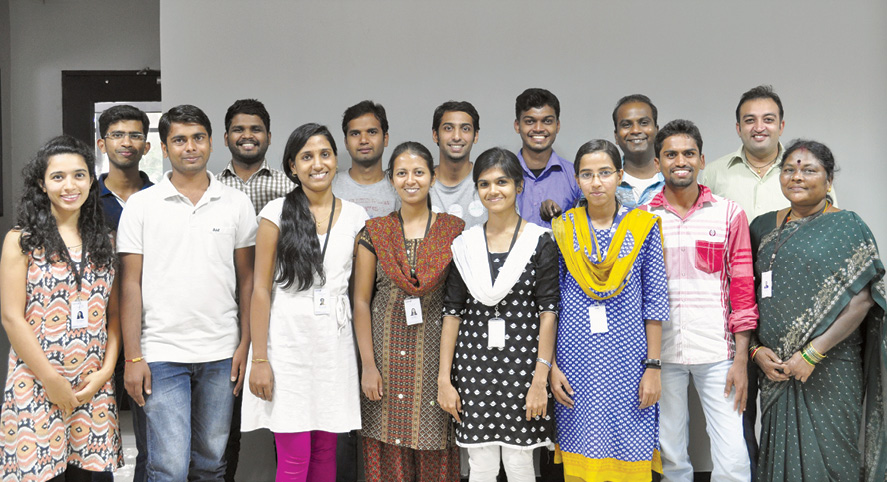
Prabu Surendra, CEO, Tymtix, whose team built SensAiry, says that research has shown that vehicles with under-inflated tyres are three times more likely to be involved in a road accident. “Yet, people do not check the tyre pressure as often as they should. One reason could be to avoid the hassle of going to a service station and waiting in queue to get the tyre pressure back up to the recommended manufacturer specified levels,” he says.
Petrol-heads could be early adopters
If you are a car or bike enthusiast, you will know how important it is to maintain the optimal tyre pressure and temperature to maximise traction. SensAiry eyes and ears, so to say, are a temperature and pressure sensor packed together. The rest of the device focuses on gathering data and comparing it to set thresholds programmed into the firmware to make the decision as to whether there is a problem that the user should know about.
The device uses a coin-cell battery and works on a 2.4GHz frequency, which enables a longer coverage for the device while measuring up to 150psi at almost 10,000rpm.
Under normal conditions, it collects data and transfers it to the smartphone running SensAiry app, where the user can go through the information presented on it. However, if there is a situation involving, say, a heated-up tyre or a puncture, the device sends out notifications to the driver so that she or he can do what is necessary.
The best part is that, what comes after the device gathers a lot of data.“For example, let’s say there is a very small puncture on a car tyre. Users would not be able to see the tyre pressure variance over a period of a few days, but the app collects data and can alert vehicle owners to these minor punctures that are not obvious to them,” explains Surendra. The product also lets you track multiple vehicles simultaneously.
Essentially, what they have done here is data visualisation and analytics on tyre and pressure data. It is somewhat similar to what the billion-dollar company Jawbone has famously done with their UP series of bands.
Another element that will be included in future models is shock detection. An accelerometer that senses shocks caused due to bumps and road problems will help users better estimate and even elongate the life of the tyre by making sure they are taking care by keeping the tyre properly inflated. It will also help them properly maintain the tyre pressure during dry and rainy months when it is recommended to slightly decrease or increase the pressure to maximise performance.
The accelerometer can also help users judge the performance of the suspension setup. If they have spent a bomb on getting Koni, Bilstein or Tien shocks for their cars, they can use this app to follow up on the installation to track how shock-data changes for the car while running on the same strip before and after suspension upgrade.
What Surendra is more excited about is the potential to use the data flowing in from a large number of SensAiry-enabled vehicles to judge the road conditions of different cities. This idea has the potential to change the way we think about judging road quality in cities.
How it stacks up to the alternatives
There are a lot of alternative tyre pressure-monitoring systems (TPMSes) in the market where they connect a gadget on the tyre and a small display is mounted on the dashboard through which you can see data on tyre pressure. In high-end vehicles this could be integrated to the vehicle’s stock infotainment system, too. But these solutions require vehicle owners to be inside their vehicles to check tyre pressure, which is not a requirement for SensAiry.
One unique challenge that none of the existing solutions for non-luxury vehicles solve is that these do not alert you about a tyre puncture or critically-low tyre pressure until you are near the car or turn on the ignition. The problem here is that it makes the situation ripe for that unfortunate day where you are greeted by a flat tyre while hurrying to your office in a jacket and trousers.
A more significant benefit is for fleet-management companies that have long trailers or road trains with a large number of tyres at complex locations. Some might have multi-axle tyres where there are eight tyres at one point in a bus. Then there are lorries with 64 tyres—imagine the pain of installing a normal TPMS.
Design challenges
Tyres on any vehicle face some very extreme conditions, so placing your components inside these is a technically-challenging aspect of their design. In fact, some people say that this is exactly the place where an electronic system should not be installed.
Breaking out of enclosure problems. Surendra explains, “One of our earliest problems was that we were unable to fit the sensing system to properly measure pressure in a feasible way. We could get it in, through a laborious process, but it would not make sense to do it from a customer standpoint or even allow us to do a proper demonstration. So while we were trying to figure this out, one of our sensor vendor’s chief research and development person invited me over and showed the facilities that they have. It was during this tour that I discovered the kind of test setup we actually needed to build the product we had in mind.”
Another problem that they had was that the enclosure was built out of aluminium. Now, aluminium has this problem that it absorbs all signals due to it acting like a Faraday’s cage. When they placed the sensor inside it, no signals could make their way out of the device. “The team was very disappointed when this happened,” says Surendra. “While we were trying to figure out how to solve this problem, we came upon a material that had the characteristics of ABS plastic and did not absorb the signals that our device needed to transmit.”

The omnipresent battery life problem. Battery life is another area where they did some tuning and revisions to come up with the perfect sauce. For instance, they designed a range extender in the device that has the consequence of reducing battery life. So what they did was modify the device so that it only activates the extender when it is really needed, like in the case of a puncture where the car needs to alert the user as early as possible.
Another event that deactivates the range extender is when the car is moving. So they used the accelerometer to figure out if the car was moving and deactivate it if it was. It also changes the frequency of testing depending on different times of the day or usage history. They eventually left the range extender out of the first version of the product to control cost, but there is a good chance that it would show up in a future version.
“Testing is one area where I am facing a challenge. Normal tyres can only handle up to 50psi of pressure, but I needed to test the sensor at 150psi to make sure it works in heavy-duty tyres. I also needed to test the sensors while running at 10,000rpm. So what I did was to get access to a dynamometer; it was pretty expensive in our case since we need to constantly try and improve the system. We are now trying to set up a custom jig to get this done. We might go for a gyroscope instead of an accelerometer for suspension and wheel-alignment issues in a future product,” explains Surendra.
Dilin Anand is a senior assistant editor at EFY. He is B.Tech from University of Calicut, currently pursuing MBA from Christ University, Bengaluru






